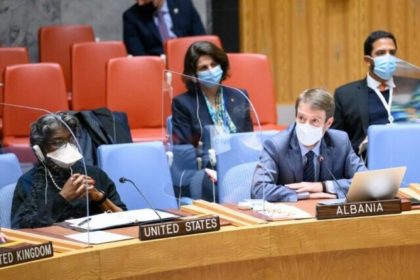A threat to the whole international security architecture
At the UN Security Council, Albania reaffirms the unwavering support for the sovereignty and territorial integrity of Ukraine within its internationally recognized borders
REMARKS BY H. E. Mr. FERIT HOXHA, Ambassador and Permanent Representative of ALBANIA to the UN Security Council
Open Meeting: Threats to International Peace and Security
Thank you, Mme. President, for convening this open meeting, and thank you Under Secretary General DiCarlo for your briefing.
Mme. President,
The primary responsibility of the Security Council is to maintain peace and security with a view to preventing conflicts in the world. We have argued here several times that in terms of prevention, the Council has still a long way to go. The Council has been seized many times to discuss the situation in Ukraine since the beginning of the aggression in 2014. And here we are again today.
We express our deep concerns on the military build-up of Russia near Ukraine in recent months. Dozens of battalions have been already dislocated to the Ukrainian border, military troops are being dispatched from Eastern to the Western part of Russia. These include heavy combat forces, tanks, artillery air defense system and ballistic missiles. Several thousands of Russian troops have also been sent to Belarus. This movement of troops and weapons is very worrying, has caused anxiety and fear among people in Ukraine, and justifiably, serious international concerns, particularly for us, in Europe.
Mme. President,
Let me reconfirm our unwavering support for the sovereignty and territorial integrity of Ukraine within its internationally recognized borders.
Dear Colleagues,
In 1994, 27 years ago, Ukraine received security assurances through the Budapest Memorandum, where Russia, together with USA and UK, pledged “to respect the independence and sovereignty and the existing borders of Ukraine.”, in exchange for giving up its nuclear arsenal. The signatories also reaffirmed their commitment to seek UN Security Council action to provide assistance to Ukraine, should it become a victim of an act of aggression. We call on Russia and the Council to expressly confirm the respect of the sovereignty and territorial integrity of Ukraine.
Mme. President,
It would be wrong to consider the threat of a military attack by Russia against Ukraine as another crisis between Russia and the West. This is a challenge to the European Security Order and to the whole international security architecture, which is based on the UN Charter. It is an affront to the 1975 Helsinki Final Act and its Decalogue upon which OSCE is founded, and where Russia is also part.
These last developments on the Russian-Ukrainian border are a well-known playbook. We have seen it in Georgia in 2008 and in Ukraine repeatedly since 2014, unfortunately at the cost of thousands of lives – civilian and military. Russia has used military violence as a means of achieving its political and geopolitical goals.
Mme. President,
Russia is a big country and has a role to play in European and world geopolitics. It can play an important part in making the world a better and a safer place. Unfortunately, it is doing the contrary. The narratives of spheres of influence in Europe or dictating by threats the geostrategic orientation of other countries are tools of another century, of another time, reminiscences of the cold war.
Countries are and should be free to join whichever organization they want, be it NATO, the European Union, CSTO or CIS. Sovereign countries take decisions by their free will, not under the threat of the gun.
Mme. President,
What is to gain in a potential conflict to which everyone anticipates the disastrous consequences? What can justify the loss of thousands of lives, widespread destruction, severance of relations, continued tension, including, as it has been made clear repeatedly, severe consequences for Russia itself? No other place knows more about war and its disastrous consequences than this room. Therefore, we must be able to see beyond, and seek other means to address issues, however complex they are or seem to be.
Albania believes that this crisis could and should be solved through talks and discussions. Finding solution through negotiations was our primary focus during the OSCE Chairmanship in Office, in 2020. It remains the same now in the Council.
There are several mechanisms to be used through diplomatic efforts. Concrete steps toward de-escalation are needed, paving the ground towards talks in efforts to seek solutions. Such efforts should be made in good faith and not be conducted in a climate of escalating rhetoric. The resumption of the Normandy format meetings last week in Paris was the right step and we hope that this process will continue.
Madame President,
We all should bear in mind that the crisis in and around Ukraine has a direct impact on the whole Europe.
The instrumentalization of the ethnic minorities, targeted cyber-attacks, political interferences here and there for political gains, and a growing tendency of genocide denial, and glorification of war crimes and war criminals, all these are acts that seek destabilization, create tension should be treated as a threat to peace and security, because they are.
This is why we deem it of paramount importance to invest in prevention, and I hope this meeting will be part of such genuine efforts.
